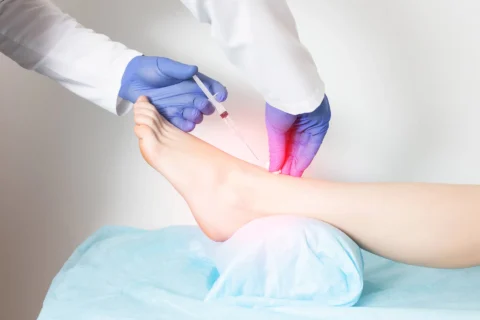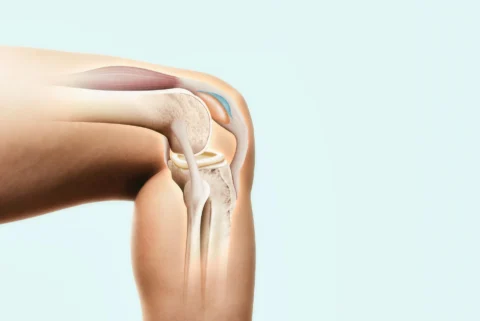Learn about the latest advancements in stem cell therapy for arthritis and how it can provide relief.
Imagine a world where your joints move effortlessly, free from the stiffness and pain that have been constant companions.
Stem cell therapy for arthritis offers hope for those seeking relief from the limitations of this condition.
But does it live up to the hype? Can it truly provide the lasting relief you’ve been searching for?
Let’s take a closer look at the facts and myths surrounding this innovative treatment, and explore if it could be the solution you’ve been waiting for.
Does Stem Cell Therapy Help Arthritis?
Stem cell therapy holds potential for relieving arthritis symptoms, but its effectiveness is still being researched and isn’t yet proven.
Clinical trials have shown that stem cells may help reduce arthritis pain, swelling, and loss of movement when injected into a joint. However, early studies have had limited success in regenerating cartilage or bone for arthritis, indicating the need for more evidence.
Researchers are optimistic that stem cells could potentially delay osteoarthritis progression by regenerating cartilage and reducing inflammation. There’s also hope that stem cells could help repair damaged tissue and increase mobility for rheumatoid arthritis patients.
Despite these promising findings, more research is needed to fully understand the long-term effects and safety of stem cell therapy for arthritis.
How Does Stem Cell Therapy Work for Arthritis?
When injected into arthritic joints, stem cells can attach to damaged areas and stimulate tissue repair through signaling to existing cells or directly replacing cells.
It has the potential to reduce inflammation and regenerate cartilage cells, providing hope for improved joint function and mobility.
While stem cell treatment alone may not cure osteoarthritis, it has shown some success in limited cartilage or bone regrowth.
Mesenchymal stem cells, in particular, may aid in self-renewal and differentiation into new cartilage cells.
Although more rigorous clinical studies are needed, the current state of research suggests that stem cell therapy holds promise for regenerating joint tissue, especially in later stages of arthritis.
Does Stem Cell Therapy Provide Relief for Arthritic Conditions?
Looking for relief from arthritic conditions? Stem cell therapy is showing potential in providing relief for arthritis.
Studies have found that stem cell injections can reduce arthritis symptoms like pain and promote tissue repair, particularly in localized osteoarthritis when injected directly into affected joints.
Mesenchymal stem cells, derived from bone marrow or fat tissue, are the primary focus of research due to their ability to develop into cartilage and bone cells.
However, more research is needed to fully understand the long-term effects and compare the benefits to other treatments. While promising, stem cell therapy for arthritis isn’t yet an established or approved treatment. Ongoing clinical research is essential to determine its safety and effectiveness.
The current evidence suggests potential benefits, but further study is required.
Can Stem Cell Therapy Help Alleviate Arthritis Symptoms?
Stem cell therapy has shown potential in reducing arthritis symptoms such as pain and promoting tissue repair, particularly in localized osteoarthritis when injected directly into affected joints.
- Stem cells may boost healing, regulate immune function, and improve arthritis symptoms.
- Adipose tissue contains regenerative cells that can help reduce inflammation and cartilage degeneration for arthritis.
- Stem cells are thought to downregulate inflammation and slow cartilage degeneration, showing potential for rheumatoid arthritis treatment.
- Early research suggests mesenchymal stem cells may help relieve pain and maintain joint function for osteoarthritis treatment.
What Is Stem Cell Therapy for Joints?
Stem cell therapy for joints involves the injection of a patient’s own stem cells to aid in the repair and replacement of damaged cartilage, bone, or other joint tissues.
- Stimulates natural healing process
- Provides pain relief and improved function
- New techniques for cartilage repair
Mesenchymal stem cells from bone marrow are commonly used. This therapy can stimulate the body’s natural healing process to regenerate tissues in joints affected by conditions like arthritis.
Clinical studies have found that it may provide pain relief and improved function for knee and other joints, though results are still preliminary. New techniques are being explored, such as combining stem cells with tissue from the damaged area to create a biologic filler for cartilage repair.
While promising, more research is still needed to determine how long benefits may last and for which patients stem cell therapy could be an effective treatment option.
Is Stem Cell Therapy Effective for Joints?
Considering the promising results shown in some clinical studies, the effectiveness of stem cell therapy for joints, particularly in reducing pain and improving function, is an area of growing interest and ongoing research.
However, it’s important to note that while some studies suggest positive outcomes, the evidence is still limited, and more extensive research is required to confirm its effectiveness.
Here are some key points to consider:
- Stem cell therapy may provide significant improvement in pain and mobility, but most studies only demonstrate short-term relief.
- Potential side effects are usually mild and temporary, such as swelling and pain.
- Stem cell therapy is generally considered safe, but it doesn’t appear to be a standalone cure and may work best when combined with other treatments.
- New research in animal models shows potential for repairing joint tissue, indicating a promising direction for further investigation.
Stem Cell Therapy Injection for Joint Pain?
With the potential for reducing pain and improving function, stem cell therapy injections have shown promise for treating joint pain, particularly in cases of osteoarthritis of the knee.
These injections involve introducing adult stem cells extracted from bone marrow or fat tissue directly into the osteoarthritic joint. The stem cells interact with the immune system and may boost tissue regeneration, leading to pain relief and improved function.
However, it’s essential to note that while some successful cases have been reported, more research is needed to determine the long-term safety and effectiveness of this treatment for different joint conditions.
The cost of regenerative stem cell therapy for a single joint is typically $4,000-$5,000 currently, with temporary swelling and pain being the most common side effects. It’s crucial to discuss the risks and benefits with a healthcare professional before considering this option.
| Pros | Cons |
| Pain relief | Temporary swelling and pain |
| Improved function or quality of life | Long-term safety and effectiveness still under study |
| Tissue regeneration | High cost |
Benefits of Stem Cell Therapy for Joint Pain
- Stem cell therapy aims to regenerate tissues and reduce inflammation, offering the potential for long-term relief.
- Research suggests that it may stimulate cartilage regeneration and interact with the immune system to enhance healing.
- Clinical studies indicate that it could improve function and reduce pain for conditions like osteoarthritis of the knee.
- Unlike traditional treatments, stem cell therapy focuses on repairing damaged tissues rather than just alleviating symptoms.
While further high-quality studies are needed, stem cell therapy holds promise as an alternative to joint replacement surgery for managing arthritis pain.
Safety and FDA approval are important considerations, so consult your doctor to evaluate its suitability for your specific joint condition.
Will Stem Cell Therapy Help Osteoarthritis?
Stem cell therapy is currently being researched as a potential treatment for osteoarthritis. It has shown promise in relieving pain and swelling while improving joint movement.
Studies indicate that mesenchymal stem cells, which can differentiate into cartilage and have anti-inflammatory properties, may be particularly effective. Early research suggests that stem cells may stimulate tissue regeneration and interact with the immune system.
Some studies have shown limited success in cartilage or bone regrowth. However, real-world evidence indicates that stem cell therapy can provide effective and long-lasting relief for knee pain.
More research is needed to confirm its efficacy and understand the exact mechanisms involved. The primary goal of stem cell therapy for osteoarthritis remains using stem cells to regrow cartilage.
Overall, stem cell therapy holds potential for relieving osteoarthritis symptoms, but further extensive studies are necessary to determine its effectiveness and best applications.
Success Rate of Stem Cell Therapy for Arthritis
Research into the effectiveness of stem cell therapy for arthritis has shown promising results, with significant improvements in pain relief and joint function reported in several studies.
Studies have shown that stem cell therapy for arthritis can result in a 58-68% improvement in pain and a 67-83% improvement in function. It can lead to an 84.31% decrease in resting pain, a 61.95% decrease in active pain, and a 55.68% increase in functionality score.
One study even found that stem cell therapy relieved knee arthritis pain at rates of 70-80%. However, it’s important to note that more research is still needed, especially regarding the long-term effects, as the effects beyond two years are still unknown.
What Is Bone on Bone Arthritis Stem Cell Therapy?
When the cartilage cushioning between bones is completely worn down, causing the bones to rub directly against each other, it’s known as bone on bone arthritis, or end-stage arthritis.
Stem cell therapy for bone on bone arthritis involves using stem cells, typically mesenchymal stem cells (MSCs) extracted from bone marrow, to potentially repair damaged cartilage. However, it’s important to note that this therapy may not be as effective for severe cases of bone on bone arthritis where all cartilage has been lost.
Research suggests that stem cells require healthy cartilage to assist in tissue repair. While clinical trials have shown promise in reducing pain and improving function for some patients with cartilage damage, further research is needed to determine the effectiveness of stem cell therapy in treating severe, end-stage arthritis.
Conclusion
Stem cell therapy offers promising relief for arthritis by targeting the root cause of joint damage. It can help alleviate symptoms and improve joint function, offering hope for those suffering from arthritis.
While research is ongoing, the potential benefits of stem cell therapy for arthritis are significant, making it a viable option for those seeking alternative treatments for their condition.











